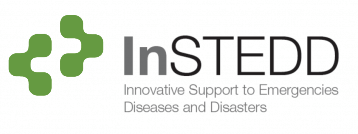Public and private organizations unite to bring mobile phone messaging tools for fighting epidemics
The Thai Health Promotion Foundation, DTAC, InSTEDD, and Open Dream CO., LTD are introducing a mobile phone texting service for public health disease outbreak communication cooperation with the public health disease surveillance systems in Thailand
January 2010 – BANGKOK, THAILAND — In disease outbreaks, hours or days saved through sending a disease report over a simple SMS message can make the difference between lives saved or lost. Public health staff in remote regions of Thailand with limited internet access will now be able to share urgent and important health data. Rapid communication through SMS will also allow specialists to analyze data in real time and halt or control a disease outbreak like H1N1.
This SMS for epidemics effort is spearheaded by The Thai Health Promotion Foundation, the Rakbankerd Foundation under DTAC CO.,LTD, InSTEDD with support from Google.org, and the Open Dream CO.,LTD.
H1N1 Subcommittee President Doctor Mongkol Na Songkhla said, “We have to be well-prepared for potential disease outbreaks. Statistics reveal disease outbreaks have increased in frequency and are taking away the lives of people we love.” Infectious disease specialists are predicting that the outbreak of H1N1 virus will continue for at least 1-3 years and that mutation of the virus can also be expected. The sooner we detect the next outbreak, the more lives will be saved.
Doctor Mongkol Na Songkhla also said, “Disease outbreaks are no doubts a threat for mankind in this era of globalization and rapid transcontinental travel. It is crucial for authorities to be well-informed of the world’s emerging diseases situation. We have learned that communication failure has cost us more than we can predict.”
The NGO InSTEDD has been working together with ChangeFusion and Opendream in developing a disease surveillance and alert system for public health reporting in Thailand. Dr. Eric Rasmussen, CEO of InSTEDD, said, “ICT is a powerful tool to help collect, , analyze and share cases of disease outbreaks such as H1N1 from remote villages. The ability to send data to local, regional and national authorities at the same time helps the Surveillance Rapid Respond Team work faster and more effectively.” DR. Rasmussen also added that the available technology allows real-time reporting and rapid response.
The system is now being implemented in 2 pilot areas including Mukdahan and Chiang Rai. Mukdahan province is an access point to Savannakhet, Lao PDR and the southern part of Vietnam while Chiang Rai is connected with Bo Kaew, Lao PDR. Workshops to train local health officials have been organized. This helps them get familiar with the system and to use the technology more efficiently.
Google.org, the philanthropic arm of Google, Inc., is supporting improved front-line communications developed by InSTEDD in cooperation with local IT developers and government disease specialists. Dr. Mark Smolinski, Google.org’s Threat Detective said, “The H1N1 pandemic has demonstrated that health-related organizations are trying their best to deal with the threat and putting their preparedness efforts to the test. The cooperation of InSTEDD, Change Fusion, Open Dream and DTAC in using SMS for real-time situation awareness and improved communications will greatly assist in early detection and rapid response.”
The Rakbankerd Foundation President under DTAC CO.,LTD Mr. Peerapong Klin-la-or said, “The collaborating organizations saw the advantage in utilizing technology in social development. Researchers reveals that up to 77.6% of Thai people use mobile phones and the ratio of Thai people who have access to the internet in 2009 is at 20.3% of total population. Because of its reach, the mobile phone, especially text messaging, is a great resource for social development.We are pleased to be part of this effort to use mobile phones to save lives.”
###
About InSTEDD
Originally conceived as the result of a 2006 TED Conference Prize, InSTEDD (“Innovative Support To Emergencies, Diseases and Disasters”) is an independent, international 501(c)3 nonprofit corporation created to save lives and reduce suffering through the intelligent use of technology. InSTEDD works with a wide range of valued partners and has received funding from Google.org, the Rockefeller Foundation and others. http://www.InSTEDD.org.
Media contacts
InSTEDD
Brooke Estin: brooke@instedd.org; +1-650-326-5000
